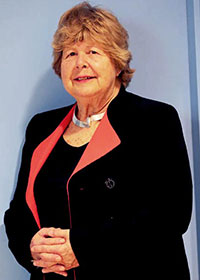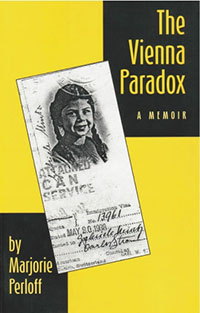On March 12, 1938, Gabriele Mintz was awakened by her mother. Hitler’s troops had taken Austria. The family — prominent, cultured, Jewish — fled Vienna for Zurich and then the Bronx. Gabriele Mintz became Marjorie Perloff. Marjorie Perloff became one of the most influential literary critics of her generation.

This fall, Perloff will receive the 2014 International Humanities Medal from Washington University in St. Louis. Granted biennially, the medal honors the lifetime work of a noted scholar, writer or artist who has made a significant and sustained contribution to the world of letters or the arts.
“The International Humanities Medal is largest prize from an American institution to cover the broad spectrum of the humanities,” said Jean Allman, PhD, the J.H. Hexter Professor in the Humanities and director of the Center for the Humanities in Arts & Sciences. “So one year we have a filmmaker like Ken Burns or a food writer like Michael Pollan, and another year we have a novelist like Francine Prose or Orhan Pamuk.
“This year, the unanimous choice is Marjorie Perloff,” Allman said. “She is one of the most interesting, important and acclaimed voices in her field. Her selection turns the conversation to issues of poetry, language and translation. It’s very exciting.”
Perloff will receive the medal, which is accompanied by a $25,000 prize, during a ceremony in the university’s Graham Chapel Wednesday, Oct. 22. She will speak on the topic “The Last Hapsburg Poet: Paul Celan’s Love Poetry and the Limits of Language.”
“I can’t think of another critic who has had such a profound impact on contemporary poetry,” said Mary Jo Bang, PhD, professor of English in Arts & Sciences. “Marjorie Perloff more or less translated, English-to-English, 20th-century avant-garde poetry. She made clear both its projects and its myriad strategies, and then linked that so-called ‘difficult’ work to the urgent social questions that had fueled it.
“She showed us how poetry that might seem as if it were standing apart from the present, was in fact mirroring it, often more accurately than poems that were less veiled,” Bang said.
The International Humanities Medal is generously supported by Dr. David and Phyllis Wilson Grossman. For more information, visit cenhum.artsci.wustl.edu.

Marjorie Perloff
Perloff is one of the foremost American critics of 20th- and 21st-century poetry and poetics. Her work has focused on the writing of experimental and avant-garde poets and relating it to the major currents of modernist and, especially, postmodernist activity in the arts, including the visual arts and cultural theory.
Underlying Perloff’s career was a question: What happens when the Viennese reverence for “high art” collides with an American democracy suspicious of “high/low” distinctions? The answers can be glimpsed in Perloff’s close attention to language; in her embrace of new and experimental forms; and in her emphasis on the importance of aesthetic pleasure and delight.
Perloff is the author of 16 books, including the influential studies “The Poetics of Indeterminacy: Rimbaud to Cage” (1981) and “Radical Artifice: Writing Poetry in the Age of Media” (1994). In 2004, she published a memoir, “The Vienna Paradox,” which explores family history and the city’s rich cultural milieu. Her most recent books are “Unoriginal Genius: Poetry by Other Means in the New Century” (2010) and “Poetics in a New Key: Interviews and Essays,” forthcoming this fall from the University of Chicago Press.
Perloff is professor emerita of English at Stanford University and the Florence R. Scott Professor of English Emerita at the University of Southern California. She is an elected fellow of the American Academy of Arts and Sciences and the American Philosophical Society.
Editor’s note: Perloff is available for interviews both before and during her visit to St. Louis. To arrange an interview, contact Liam Otten at (314) 935-8494 or Liam_Otten@wustl.edu.